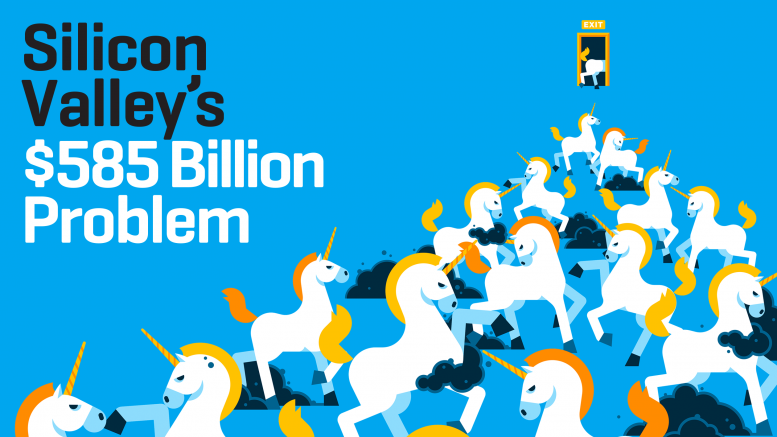VCs have pumped up the value of the “unicorn” startups. Now tech IPOs are in trouble. Good luck getting out.
Of all the Silicon Valley IPOs in the past couple of years, Lending Club’s might have been the surest bet of all.
The San Francisco peer-to-peer lender is a star in the world of “fintech,” a growing sector made up of financial technology companies bent on disrupting the traditional banking sector. Its backers include venture capital royalty such as Kleiner Perkins and Union Square Ventures, not to mention Google
and Alibaba
. The startup’s gold-plated board of directors includes luminaries such as John Mack, the former CEO of Morgan Stanley
; former Treasury Secretary Larry Summers; and Mary Meeker, the one-time doyenne of Internet IPOs who is now a Kleiner partner. In other words, Lending Club
had assembled a very smart-money crowd. Its much-buzzed-about offering was viewed, understandably, as a slam dunk.
In December 2014, led by underwriters at Morgan Stanley and Goldman Sachs
, Lending Club priced its shares at $15, above the high end of the proposed range of $12 to $14. The IPO was 20 times oversubscribed and instantly gave the company a market value of nearly $6 billion. On the first day of trading, Lending Club’s stock jumped almost 70% before pulling back to close at $23.42 a share, a one-day pop of 56%. For shareholders who got out quickly, it went in the books as another very successful offering.
Then reality set in. Lending Club’s stock peaked about a week after its IPO, at nearly $26 a share, and has been retreating ever since. Never mind that the startup delivered extraordinary financial results in its first year as a public company: Lending Club’s operating revenue was up more than 100% in the first nine months of 2015 compared with the same period in 2014, and its Ebitda, a measure of earnings before subtracting expenses such as interest and taxes, was up more than 200%. The stock recently traded around $8 a share, nearly 50% below its $15 IPO price.
 Lending Club CEO Renaud Laplanche on the floor of the New York Stock Exchange on the day of his company’s IPO in December 2014. The stock got a first-day pop of more than 50%. It now trades well below the IPO price.Photo: Richard Drew—AP
Lending Club CEO Renaud Laplanche on the floor of the New York Stock Exchange on the day of his company’s IPO in December 2014. The stock got a first-day pop of more than 50%. It now trades well below the IPO price.Photo: Richard Drew—AP
Naturally, Lending Club CEO and co-founder Renaud Laplanche wishes the stock price were higher. But he’s trying to look past short-term vicissitudes. “Part of the main reason for going public was to continue to establish Lending Club’s brand and credibility,” he says. “We’re building a big company. It’s going to take a very long time, but we want to do it in the public eye with full transparency. I think from that standpoint, we got rewarded. I think the Lending Club brand is a lot more established now than it was a year ago.”
That may be true with customers and bankers, but ask any retail investor who made a bet on Lending Club at around $20 a share about the company’s brand today, and the response is likely to be a grimace followed by a torrent of vitriol.
Unfortunately the Lending Club story is not an isolated case. Time and time again during the current IPO cycle, Wall Street underwriters—egged on by ambitious CEOs, hungry venture capitalists, and favored institutional investors—have hyped one technology IPO after another. The bankers price the offerings for perfection, watch them soar on the first day of trading to deliver the coveted first-day spike, and don’t stick around to offer an explanation after the shares plunge below the first-day price. (Morgan Stanley and Goldman Sachs declined to comment for this story.)
Welcome to the world of zombie tech stocks—once-highflying IPOs wandering aimlessly in the wasteland of the public equity markets and understandably unloved by investors. Many have familiar names, such as Zynga (down about 75% from its IPO price)
, Twitter (down 30%)
, and Groupon (down 85%)
. Online craft marketplace Etsy
recently traded 56% below last year’s price at IPO and 77% under its first-day close. Others that are less well-known—like Nimble Storage (67% below IPO price)
—have been just as disappointing.
To be fair, some major tech IPOs have soared in recent years, among them LinkedIn
, Tesla Motors
, and, after a rocky and controversial start, Facebook
. But these are the exceptions. The detritus far outnumber the success stories, raising the question, Is the method by which companies go public as broken and inequitable as it ever was? That would certainly seem to be the case. And the problem is especially acute when it comes to tech companies for which relentless forward momentum is key not only to pleasing investors but also to attracting talent and keeping their competitive edge.
This set of facts doesn’t bode well for the current wave of talked-up technology companies in the IPO pipeline—the so-called unicorns, or private startups valued at $1 billion or more by their investors. This once-rare species of startup has proliferated lately in Silicon Valley and beyond—from headliners such as Uber and Airbnb to lower-profile newcomers like Apttus and HelloFresh. Last year Fortune identified more than 80 unicorns for a cover story on the phenomenon; by our most recent count, that number has grown to 173. (Click here to see the new Unicorn List.) According to CB Insights, a research firm that tracks venture capital investments, private investors have plowed some $362 billion into startups in just the past five years.
That means that a tremendous backlog of potential technology IPOs is building up just as the stock market is beginning to look very wobbly after its nearly seven-year bull run. Indeed, U.S. stock indexes began 2016 with their worst first-two-week period in history. The S&P 500 fell 8% in the first 10 trading days, and the S&P tech sector underperformed the broader market by a full percentage point.
For an already weakening tech IPO market, the turbulence in stocks is a punch to the stomach. In mid-January, IPO research specialists Renaissance Capital put out a special report called “Exploring the Disappearing Technology IPO.” The trends it identified were not encouraging. From 2012 through 2014, according to Renaissance, there were an average of 36 venture-backed tech IPOs per year. But in 2015 that number dropped to 23, and only seven of those offerings happened in the second half of the year, partly because of a stock market correction in August. Though the average time from founding to IPO reached a high for tech deals in 2015, the profitability of the typical technology company going public has plunged into negative territory over the past couple of years. The median Ebitda for tech companies going public in 2015 was –$9 million.
All signs point to a continued slowdown in tech IPO activity in 2016, says Kathleen Smith, a principal at Renaissance and the company’s manager of IPO-focused ETFs. She says it won’t take long for the unicorns to feel the chill as well. “What’s happening now is just going to take the bottom out of these private valuations, many of which are imaginary,” says Smith. “And this valuation reset is going to have a very negative effect on new funding.”
It appears that a reckoning is coming in the tech world. The combined value ascribed to the 173 unicorns by their investors is a stunning $585 billion—an especially astonishing figure given that so many of them aren’t even close to profitable. Sky-high valuations—driven in part by unicorn mania and an influx of money from nontraditional (and less disciplined) venture investors—have limited the number of potential acquirers for a lot of the buzziest companies. (For more, read “Three Unicorns to Bet On.”)
A number of startups may have hoarded enough capital to ride out the rough patch, but even those that survive could experience mass defections and morale-killing “down rounds.” In mid-January, for example, check-in app company Foursquare raised $45 million in new venture funding but was forced to accept a valuation of less than half the $650 million value it was given by its investors a few years ago. “I imagine there’s going to be some pivots in some business models,” says John Gabbert, founder and CEO of VC data provider PitchBook.
There is also certain to be increased pressure from the VC community for any tech company on the verge of readiness to seek the “exit” of the IPO process even as it is shrinking. But every IPO currently trading below its IPO price creates a negative feedback loop, making the odds of the average unicorn getting out a little longer every day. And it doesn’t help that the process is fundamentally rigged against them.
Source: fortune.com






Be the first to comment on "Silicon Valley’s $585 Billion Problem"